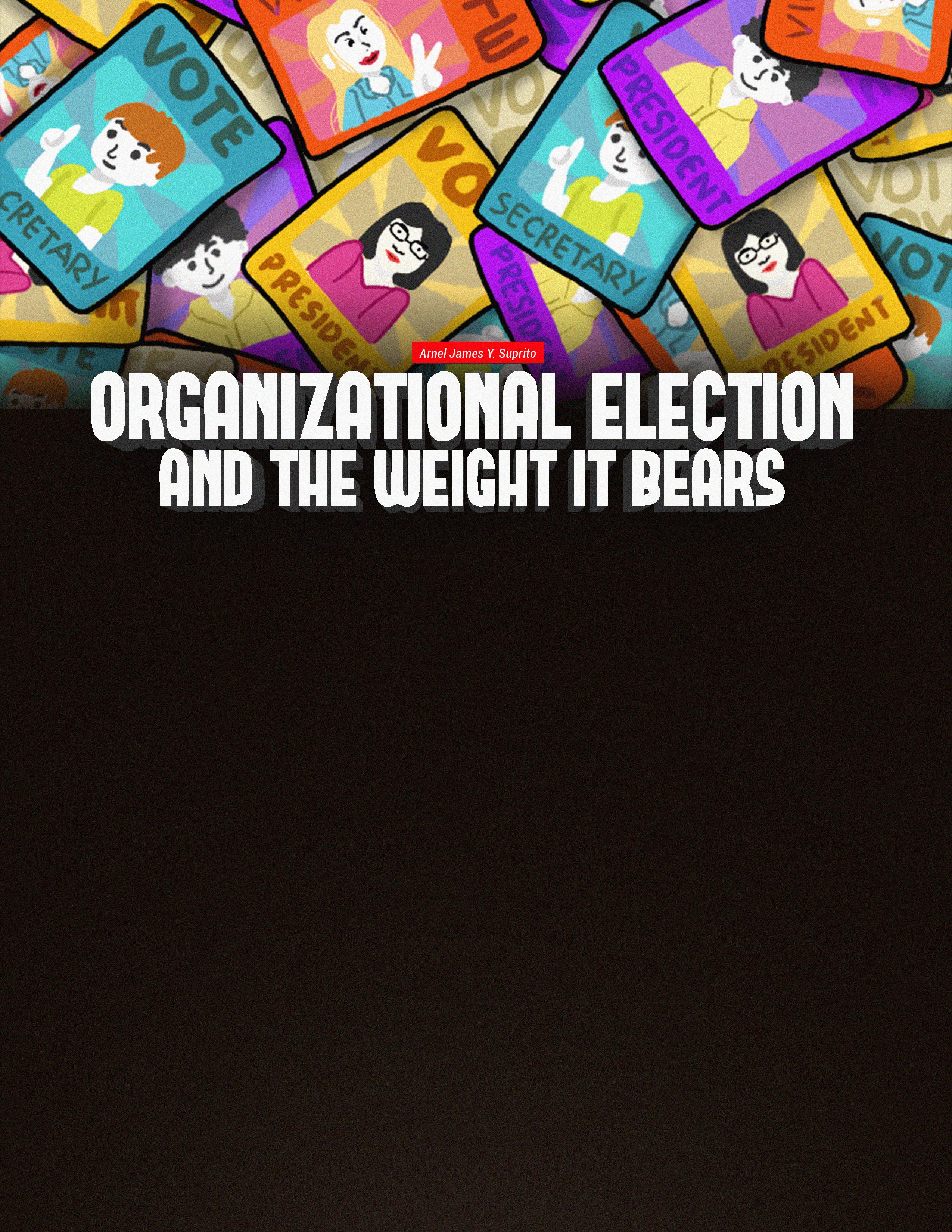
5 minute read
Organizational Election and the Weight it Bears
Democracy, sovereignty, and order − these are only a few of the salient qualities of a government that puts its people over its own interests. A government is made up of individuals who have been democratically elected. Specifically, in the Philippines, where democracy is extensively practiced, Filipinos get to vote for who they want to lead them forward. However, despite the fact that there is a constant change of administration in the nation, it is still considered a third-world country. This is a reality that we are facing today, and the government is a contributing factor to why there is a pest culture in our country, in which the people are somehow to blame for electing inconsistent individuals. Because of those erroneous decisions, it then begs the question, "Why is it important to conduct elections and participate in them genuinely?"
We all had elections in elementary and junior high school. We all started small and were thrilled at the idea of being elected as muse/escorts, or even just the mere thought of being in power. We were taught of the do’s and don'ts of voting, and it served as the foundation for how we view college elections now as empowering and rewarding. In a way, having superficial elections felt right, because it somehow molded us into individuals who look forward to new leadership and positive change. However, because it is a given that young minds are still the ones governing in-campus organizations, such leadership is inherently prone to blunders and errors. As a result, no valid leadership was established, and campus elections only served as a training ground for aspiring student leaders and voters in the future.
Advertisement
As we advanced to a higher level of education, campus organizational elections grew more serious and, arguably, more interesting for eager leaders. Leading others became more of a responsibility rather than a privilege, and managing a large population became more of a job rather than a school assignment. It is no longer a child's game where shortcomings can be forgiven with apologies and consolation. Mistakes are no longer forgivable; instead, they are negotiable. Intentional misconduct is a crime against the law and societal norms. In this context, organizational elections can be viewed as an essential component of every educational institution. The officers we elect to power have the ability to either push us down or pull us out of a pit. The people we elect to positions have the authority to define how the organization will function for as long as they are in term. And when the leaders' choice does not meet the requirements and interests of the body, conflict arises. That is why it is crucial for the student body to be keen on who they want in power and consolidate on what they want for the organization’s future.
In the words of Emmanuel F. Dooc, a writer on the Business Mirror website, “Voters should think clearly and critically when making their choices. They should realize the severe consequences of their decisions.” Every time we elect a new set of leaders, the organization's future is at stake. If this "new set of leaders" fails, it will undoubtedly have a wide-ranging impact. A chain reaction that will serve as a reminder for the students to vote wisely, as well as an encouragement for those in positions to initiate their organization’s election and urge their fellow students to exercise their right to suffrage. By doing so, it opens up possibilities for development for the organization, bolstering the trust that it has built over the years of service and raising the credibility of the individuals behind it for transparency and accountability. Elections should be held regardless of how small the organization is or how little the population it serves to ensure that members consolidate on who they want to lead them and to guarantee a just and honest regime. For it is no longer new to us that when we make decisions, we either reap the benefits or suffer the consequences. When an administration fails to do what is expected of it, it is seen unsuitable for the role and hence undeserving of the votes cast for it. The officers failed their pupils, and the students, in turn, failed the organization.
As the saying goes, “the youth of today could be the leaders of tomorrow.” In the foreseeable future, irresponsible student voters will remain irresponsible voters or citizens. And if the untrustworthy officer gets elected to a higher position, he or she will be the same undependable leader in the future. It's like a domino effect, with impacts that not everyone can see but something that the majority can feel.
Elections in student organizations can shed light on the relatively dark and bleak world of school politics which only results in negative change. What it actually means to elect a new set of student leaders is to govern the student body and to correct some of the previous administration’s mistakes in order to improve the organization's future goals. Exercising one's right to vote is not only deemed important but it must also be done within the context of what is at stake and what the organization's future will be. Leadership requires both passion and commitment, and student leaders must not only be enthusiastic about leading, but they must also put forth the necessary efforts that will bring an organization, and its people to new heights and higher grounds.
by Arnel James Y. Suprito





